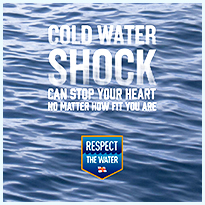Immersion in cold water rapidly incapacitates you and can kill you.

The sudden exposure of your head and body to cold water can cause a number of involuntary body reactions – this condition is known as cold water shock. It is one of the most profound stimuli that the body can encounter and it cannot be prevented. It can be as swift as it is deadly.
Because cold water shock occurs well before the effects of hypothermia, it is far deadlier, yet less understood, by the recreational boater.
See the full article from the RYA HERE
If you enter the water unexpectedly:
- Take a minute. The initial effects of cold water pass in less than a minute so don’t try to swim straight away.
- Relax and float on your back to catch your breath. Try to get hold of something that will help you float.
- Keep calm then call for help or swim for safety if you’re able.
If you’re planning on enjoying the water:
- Check conditions – including water temperature – before heading to the coast. Visit metoffice.gov.uk for full surf reports in the UK and Ireland.
- Wear a wetsuit of appropriate thickness for the amount of time you plan to spend in the water and the type of activity you’re doing, if entering.
- Wear a flotation device. It greatly increases your chances of making it through the initial shock. See our guidance on lifejackets and buoyancy aids (PDF 3.3MB).
Our seas and rivers are cold enough to leave you helpless in seconds. Treat water with respect, not everyone can be saved.
See the full article from the RNLI HERE

